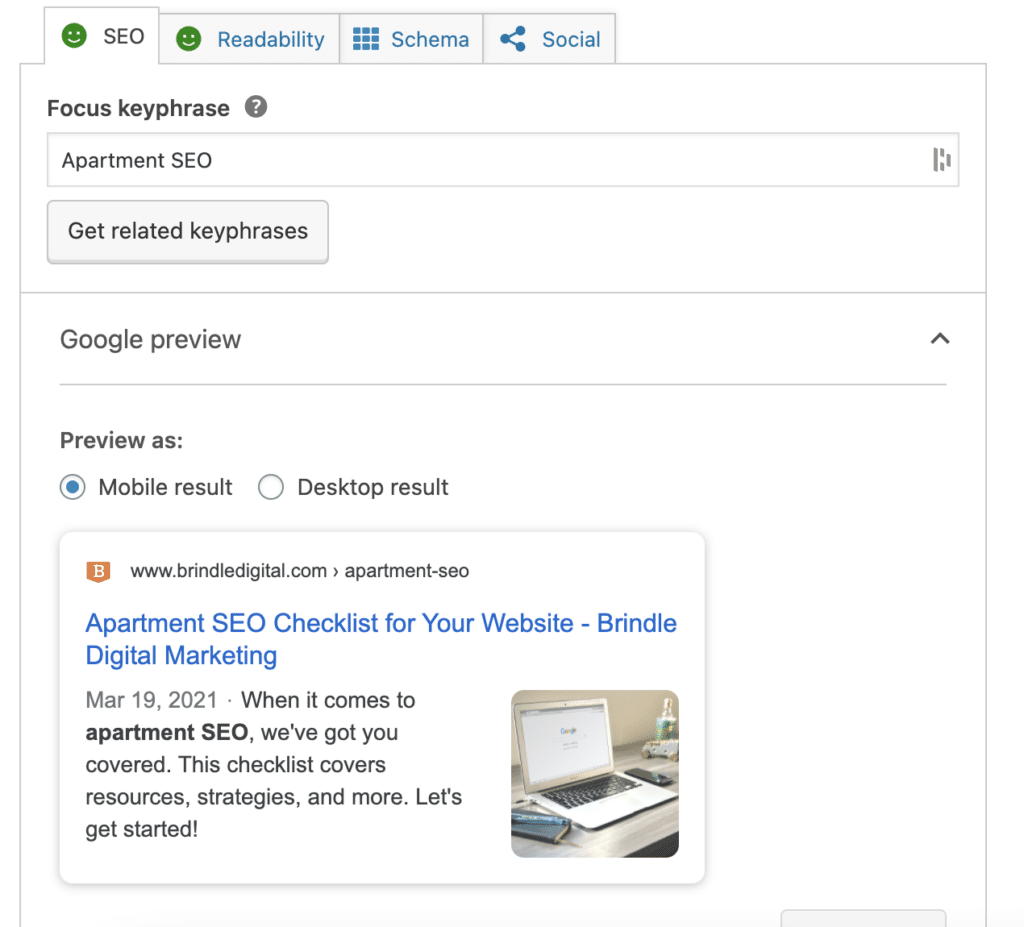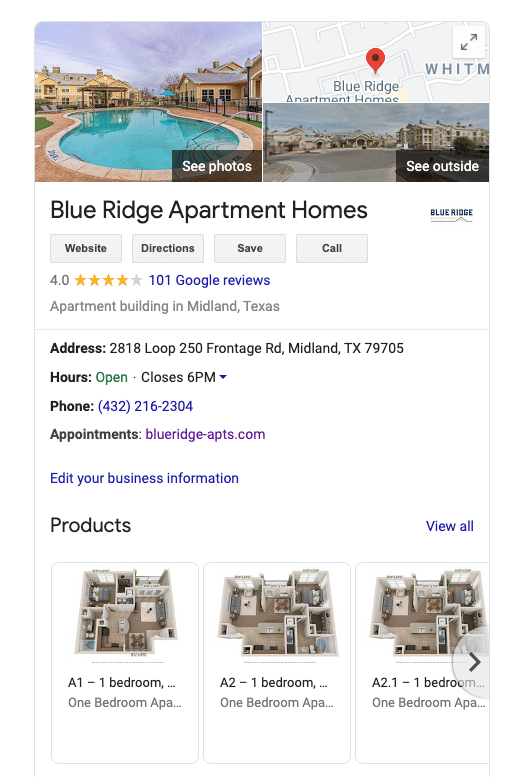Remember the good ol’ days when having a website was enough to set you apart from the competition? Okay, so that was a LONG time ago… but there are still plenty of ways you can gain a competitive edge on your website. First step? Using our apartment SEO checklist.
For apartment search engine optimization, the tools and opportunities are limitless. With a handful of these best practices, you’ll see a huge difference.
Let’s get started!
Our apartment SEO checklist for websites
get the right tools for success
Like any project, you’ll want to start by laying the foundation first. After the following tools & resources are set up, you can check, track, and refresh your SEO ranking! There are plenty of search engine optimization tools out there to help, so let’s go over the ones we care about the most:
1. Yoast or SEO Press

If you have a WordPress site, Yoast or SEO Press is a great place to start. These plugins simplify the SEO technicalities and provide recommendations for improvement. As an added bonus, Yoast will also generate a custom sitemap for you, so Google can crawl and index your web pages.
Start by activating the plugin on your website. After some keyword research (see below), you’ll need a title and meta description for every page. This helps your website show up on Google.
2. Site Map
Sitemaps are very important for apartment SEO. Google uses them to interpret your website and evaluates the relevance of each web page. Your SEO efforts will influence the way Google ranks your website, so they go hand-in-hand. Not sure if your website has a site map? Type “yourdomain.com/sitemap.xml” into Google to find out! Remember that Yoast will create you one as well.
3. Google Analytics & Google Search Console
Use Google Analytics and Google Search Console to track your apartment SEO progress.
Analytics is essential for website visitor behavior, acquisition data, and so much more.
Search Console will…
- Help you watch keyword performance
- Alert you of any issues with your sitemap
- Give you valuable insight to what your users are searching to find your website on Google.
This way, you can use the data to adjust your apartment SEO strategy as you go.
4. Google My Business (GMB)
Creating a Google My Business account is simple. Not only does it play a vital role in brand reputation and SEO ranking, but it affects other platforms. Google pulls information from your GMB account and populates it in new places. You can expect business descriptions, reviews, photos, and ownership features to transfer.
Because of this, you need to keep your profile updated with availability, hours, and photos. There are lots of opportunities to add information here, so add as much as you can. Highlight your small business status, your social handle, appointment links, etc.
This can be the deciding factor that convinces some people to visit your website. Also, adding keywords to your business description is an easy way to boost your apartment SEO.

5. Robots.Txt File
And one of the last major steps to set you up for success? A robots.txt file. This tells Google where it can and can’t go on your site. Check your own robots.txt file by searching “yourdomain/robots.txt” into Google. If you don’t have one, you’ll want to create one.
Once you have the correct tools and plugins in place, you can pin-point your apartment SEO goals.
PLAN GOALS AND RESEARCH KEYWORDs
You’ve got the tools, now it’s time to iron out the strategic details. In this apartment SEO checklist, we recommend starting with keyword research.
You can’t control what people search for, but you can control how you answer those existing search terms. First step? Discover what questions your clients are asking, so you can provide the best answers.
You’ll want to hand pick a few specific keywords that are relevant to your business and to your audience. SpyFu, Ubersuggest, and Ahrefs (among others) provide detailed information about keywords. Google Keyword Planner is another great option – and it’s free!

Pay attention to these terms as you research:
- Search Volume: How many people are actually searching for this term? The higher the number, the more competition you’ll face.
- Keyword Difficulty: On a scale from 0-100, this ranks the difficulty of a particular keyword.
- CPC: The Cost Per Click is the cost value for a certain keyword. This refers to paid ads, in case you focus your efforts there.
- Related Keywords: SEO loves synonyms, so once you’ve narrowed down your keyword list, look for similar phrases or words as well! These are also referred to as “semantic keywords”.
Keep in mind – some apartment SEO keywords are more difficult, so they will take longer to gain traction with. You want great keyword opportunities that are attainable for your apartment community.
Optimize Content & Follow Apartment SEO Guidelines
Once you’ve determined the best keywords for your apartment website, start using them in your (new and existing) website copy.
With quality content to post, you can increase your website value. Check out these apartment SEO practices:
- Make sure to sprinkle your keywords and key phrases throughout your post.
We’re talking about the first paragraph, the title, the URL slug, the meta description, the image alt tags, and the headings (H1, H2, H3). As the most influential places to include the keywords, you’ll want to focus on these areas.
- Organize your blog in a way that is easy to view and read.
Keep it short and sweet! With smaller paragraphs and sentences, you’ll improve readability. Another great way to simplify your blog content? Inserting visuals between long chunks of text.

When it comes to skim-ability, headers, bullet points, and lists will be your best friend!
- Build authority as a content creator by including both internal and external links in your blog.
Don’t be afraid to link to other quality websites! You might be able to build a relationship with other brands and businesses and get links to your site as well.
Plan for upkeep (apartment SEO doesn’t manage itself)
Following this apartment SEO checklist is a great place to start, but SEO is a continual process. Google is always changing, links are evolving, and some things won’t last forever!
Stay on top of your apartment website SEO ranking by tracking. Pay attention to links, mobile views, load times, and crawl errors. These issues could damage your website ranking in Google’s eyes without management.
Ready to optimize your apartment website?
Take what you’ve learned in this apartment SEO audit checklist, and get to work! Even a few small changes will have a positive impact on your website’s organic success.
Don’t hesitate to reach out to us at Brindle Digital Marketing for any of your marketing or web design needs! Our team is more than happy to help you create or redesign your apartment website. If budgets are a concern, we also offer an affordable apartment website template brand called Bluprint. We’re here to provide personalized support and help you achieve long-term success with your apartment website!
